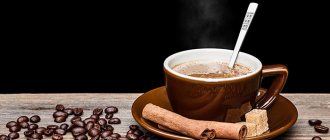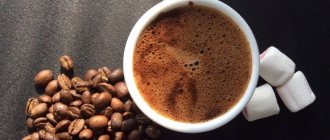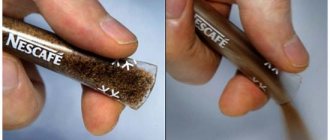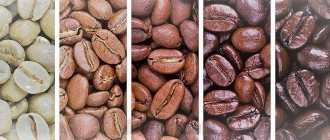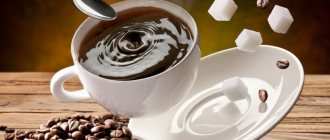For people who prefer decaffeinated coffee, it's not so easy to find a really good drink. Instant has a specific taste, and besides, it is not healthy at all. Naturally ground is better, but can be hard to find. We tell you all about how ground decaffeinated coffee is made, what brands you can buy and where you can buy them, and what makes them special.
How to make decaffeinated coffee
Let's start with the fact that no matter how hard people try, no matter what technologies they invent, no one has yet been able to completely “defeat” caffeine. You can find out where there is more caffeine in tea or coffee here.
5-10 milligrams of this substance still remain in “decaffeinated coffee”. This is not so much - a cup of natural cocoa contains about the same amount.
We talked about the composition and properties: health benefits and harms of cocoa powder in this publication.
The process of extracting caffeine molecules is called “decaffeination”: there are several ways to do it, and the package with the finished product usually contains information about which of them was used.
If you think that this information is not important for you, you are mistaken: there are both safe (and at the same time financially costly) technologies, and inexpensive methods, sometimes harmful to health, which are not adopted by the most conscientious producers, for whom the most important thing is save.
What decaffeination methods are most commonly used? This:
- classic (its second name is European);
- water (or Swiss, since it was developed in Switzerland, and this happened in 1979);
- evaporation method (authorship belongs to German specialists, the method has been used since 1970).
Let's tell you more about them. The European method is as follows: coffee beans are immersed for some time in hot, but not brought to a boil, water, which is then drained, and a solution called “methylene chloride” is added to the beans (this is an artificially synthesized, highly volatile liquid used in various industries, including including food, as a solvent).
After a certain time, this solvent is removed by washing it out of the grains not just with hot, but with boiling water.
After this, the coffee beans are dried. This method is used today by about a dozen world coffee producers. It is economical, allows you to preserve the structure of the grains and their taste with minimal losses.
The Swiss method is considered one of the most expensive, but environmentally friendly. The beans are filled with water, into which unnecessary caffeine and, unfortunately, much needed aromatic oils are transferred.
This water is then passed through special filters, on which the caffeine settles. And the water free from it, filled with aromatic coffee substances, is again poured into the container with beans.
Then they do it all again. This multi-stage operation allows, according to experts, to remove caffeine almost completely, or more precisely, by 99.9 percent.
How are decaffeinated beans produced using German technology? As in the European method, using a solvent. Only in this case, the gas - carbon dioxide - acts as a solvent.
At high atmospheric pressure (and in decaffeination devices a pressure of 250-300 atmospheres is maintained) it turns into a liquid state.
The beans immersed in this liquid give it caffeine. The solvent is later removed using carbon filters and “rinsing” the beans in water.
For an ordinary consumer who is not an expert in the field of chemistry, a natural question arises: is this method harmful?
According to experts, carbon dioxide is not a toxic substance, and in addition, the “washing out” process is carried out with special care.
An interesting fact: in 2004, trees were discovered in Brazil whose fruits contain another substance instead of caffeine - theobromine (usually found in cocoa).
It turns out that nature itself took care of our health. This coffee is already available to consumers in many countries around the world, and scientists hope to use this unique natural material to develop new varieties of decaffeinated coffee.
In this article, we have prepared for you a recipe for iced coffee, as well as useful tips for preparing the drink at home.
What is a French press? How to use a kitchen appliance to make tea and coffee? Read in this publication.
Freeze-dried coffee - what is it, what does it mean? Details are here: https://chay-i-kofe.com/kofe/vidy-kf/chto-znachit-sublimirovannyj-kofe-chem-otlichaetsya-ot-granulirovannogo-reyting-luchshih-marok/
Useful information about caffeine
Caffeine is scientifically called a purine alkaloid.
It is found in tea leaves, coffee beans, guarana, cocoa, mate, cola and other plants. The substance is a psychostimulant, having a stimulating effect on the nervous system. Once in the human body, caffeine accelerates heart contractions and dilates blood vessels. Thanks to this effect, the substance is actively used in pharmaceuticals: it is used to create many medicines against migraines, headaches, and also as a stimulant of the heart muscle. All spheres of influence of caffeine on the human body have not yet been studied, but it has been precisely proven that it has an effect on the central nervous system. The taste and aroma of coffee excites the mind, eliminates drowsiness and fatigue.
The benefits of this type of coffee
The benefit of this drink lies primarily in the fact that for people who, for some reason, are contraindicated for caffeine, and who do not have the strength to refuse a morning cup of an aromatic drink, decaffeinated coffee gives them a chance.
And this is a good start to the day, a positive attitude.
From a medical point of view, decaffeinated coffee has other “advantages”:
- it is useful for diabetics (it activates the brain, which “gives the command” to better absorb glucose), and helps other people prevent the development of diabetes;
- improves the functioning of the digestive system;
- it has a less pronounced diuretic effect than coffee, which means that less useful calcium will be washed out of the body;
- recommended for representatives of the stronger sex as a prophylactic against prostate and gout;
- is the prevention of benign tumors;
- helps people with high blood pressure normalize it;
- You can drink it (unlike traditional coffee) late in the evening without the risk of a sleepless night.
Can pregnant women drink it?
During pregnancy, a woman has to give up many foods and drinks to which she is accustomed. This also applies to coffee.
Doctors warn that drinking drinks containing caffeine can cause premature birth or miscarriage.
If a woman cannot do without coffee, she will have to significantly reduce (to one or two cups a day) the amount of drink she consumes, and it should not be strong. Find out more about whether you can drink coffee during pregnancy here.
The question arises: maybe then switch to decaffeinated coffee? This would be reasonable, however, according to experts, the benefits and 100% safety of such a drink for an expectant mother have not yet received scientific confirmation, so it is better not to take risks.
When breastfeeding
When a nursing mother asks doctors whether she can continue drinking the decaffeinated coffee she was accustomed to during pregnancy, she will most likely receive a negative answer.
Firstly, this product contains, albeit scanty, but still dangerous for the baby, a substance - caffeine.
Secondly, chemicals were used during the processing of coffee beans, what if not all of them were completely removed?
It's better not to take risks! This point of view, by the way, is shared by pediatrician Evgeniy Komarovsky, known from television programs, whose opinion is listened to by many young mothers.
Previously, we have already examined this question in detail - is it possible for nursing mothers to drink coffee?
The program “About the Most Important Thing” talks about the benefits and harms of decaffeinated coffee:
How does all this affect the taste?
In the first two methods (especially straight), the beans lose not only caffeine, but also a significant portion of the flavor profile. In addition, grains of initially low quality are usually decaffeinated using the direct method. This means that you are very likely to come across coffee without outstanding taste: just an average taste, like from a pack of Nescafe.
Decaffeinated green beans are often roasted darker than normal to achieve a thicker flavor. With a light roast, the drink may turn out to be completely bland, which means that the poor caffeine hater will have a hard time tasting everything that is in the quality bean. This deficiency will be smoothed out in milk drinks with syrups, but without modifiers it will be difficult.
The Swiss Water method preserves the taste much better, but it also has important disadvantages. Firstly, it is expensive and time-consuming, which will definitely affect the price tag of the finished product. Second, absorbed caffeine cannot be reused or sold. And this makes the price rise even more.
Famous coffee brands
The best caffeine-free product is supplied to world markets by German, Swiss, American and Colombian manufacturing companies.
The most popular are Grandos Express, Grandos Extra Mocha and Aromatico.
In beans:
- Colombian Arabica;
- Montana Coffee (from Ethiopia and also from Colombia).
Ground:
- Lavazza Dek Decaffeinato (Lavazza);
- Lucaffe Decaffeinato;
- Cafe Altura;
- Green Mountain Coffee.
The soluble product is represented by many brands well known to the buyer:
- "Jacobs Monarch";
- "Nescafe Gold Decaf";
- Ambassador Platinum.
Do you want to know what the calorie content of coffee is: with milk, without sugar, with cream and without? We'll tell you! We count calories of different types of coffee in this article.
Detailed step-by-step instructions on how to use the coffee machine, as well as useful tips and tricks, can be found in this publication.
Which is better: instant or ground coffee, decaffeinated coffee?
It is impossible to answer this question unambiguously. Each product has a number of positive properties and disadvantages. An instant drink has the following advantages:
- It can be stored for a long time.
- It's cheap.
- Prepares quickly.
- It has various additives that give it a good aroma.
Benefits of ground coffee:
- Differs in vitamin content.
- Invigorates the body.
- It has a pleasant taste and aroma.
Ground drinks are made from higher quality raw materials. The result is the product’s ability to energize a person and keep the body in good shape. Instant drinks do not have a similar effect. Another distinctive feature is the concentration of taste. Ground coffee is richer and stronger.
Contraindications and possible harm
For a long time it was believed that a caffeine-free drink was absolutely harmless. But, like any relatively new product, this coffee is constantly in the field of view of doctors and is being closely studied.
Recent studies have noted its negative effects on the heart and blood vessels. Whether regular coffee narrows or dilates blood vessels, you can find out by following the link.
Experimental data have shown that people who regularly drink such coffee accumulate too many free fatty acids in their bodies (which usually happens to those who eat at fast food establishments).
Another cause for concern is the use of “chemicals” in the decaffeination process.
In addition, during processing, grains lose some of their aromas, and manufacturers make up for them with artificial flavors, that is, also “chemicals”.
However, these points require more careful study.
Doctors are also afraid of addiction to the drink, which can cause a person to experience fatigue, drowsiness and even depression.
However, this will not happen if you do not forget about a sense of moderation and limit yourself to a couple of cups of decaffeinated coffee a day.
Conclusions:
- Ground coffee, which does not contain caffeine, is much healthier than instant options.
- Decaffeination is usually done by dissolving, steeping, gassing, or straining through a carbon filter.
- The price varies depending on the cleansing technology and brand, and can range from 240 to 1800 rubles, so you will find an option that suits your budget.
- Good decaf tastes just as good as natural decaf.
- Don't drink too much decaf - 5-7 cups can contain as much stimulant as one cup of raw decaf.
Reviews
Inna A .: “What is the name of my favorite decaffeinated coffee? Carte Noire. I haven’t cheated on him for five years. True, I recently came across an obvious fake in one of the online stores: the taste of chicory, burnt particles... It's a shame! But I still won’t give up this coffee, I’ll only now buy not the large packaging, but the small one - if something happens, I’ll be too sorry to throw it away. And what a latte this coffee makes! I drink it in the morning and have enough energy until the evening.”
Daria B .: “While I was expecting the baby, I decided for myself that I wouldn’t drink coffee now. But without coffee I began to feel unwell, it seemed like my heart even began to tingle or I was imagining all this... In order not to suffer, I bought my favorite Nescafe, but without caffeine. Life has become easier again."
Alexey R .: “I somehow didn’t even notice that there was something wrong with the coffee when they poured me a cup of decaffeinated coffee for the first time. Looks like a regular Arabica. But I can afford such coffee not only in the morning, but also in the evening, even when I spend a long time at the computer.”
Review of popular coffee brands
Arabica is considered one of the popular grain brands. The product manufacturer uses beans with a low content of alkaloids for preparation. After processing the raw materials, high-quality coffee with an exquisite taste and aroma is obtained. Ground drinks are produced from raw materials supplied from Brazil. During processing, grains are not soaked in aggressive chemical solutions. Because of this, ground drinks are considered rich and healthy foods.
Popular brands in great demand:
- Green Mountain.
- Cafe Altura.
- Lavazza Decafenato.
The products of these manufacturers are also used for brewing in coffee machines. Instant coffee is considered the most popular product. The best brands of such products are considered to be:
- Ambassador.
- Nescafe.
- Jacobs.
Despite their popularity, instant drinks are considered to be the most harmful to health. It is not recommended to consume them in large quantities.
Many popular manufacturers add decaffeinated coffee to their range
How much can you consume without harm to health?
In order not to harm your health, you need to remember the dosages established for use. It is recommended to drink no more than 3 cups of the drink per day (with a mug volume of 150 ml). It is also worth taking into account your own age and health status. If there are serious pathologies in the body, the number of servings should be reduced by half. Periodically it is worth doing fasting days and breaks for a period of 7 days. At this time, it is recommended to give up coffee drinks and give preference to herbal teas.

